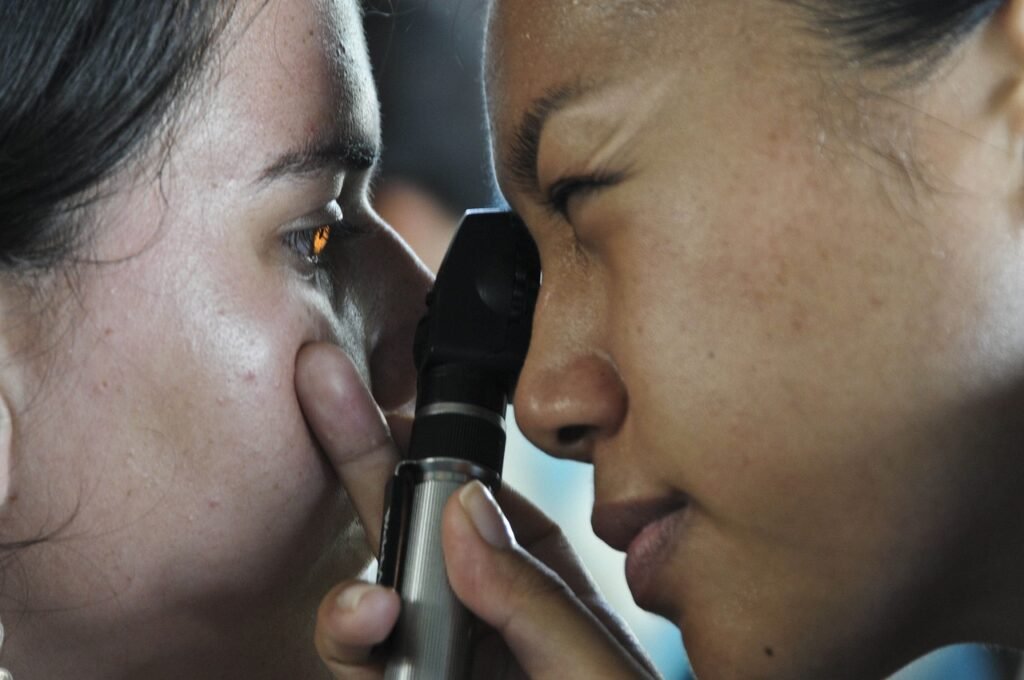Caring for your eyes is crucial for maintaining good vision and overall well-being. In today’s world, screens dominate our daily lives. So, it’s more important than ever to learn tips for eye health and adopt habits that promote eye health.
This comprehensive guide will cover everything you need to know about keeping your eyes healthy and preventing common problems. From simple lifestyle changes to expert advice, these tips for eye health will help you prioritize your vision and enjoy clear, comfortable eyesight for years to come.
Table of Contents
- Understanding Your Eye Health
- Taking Proactive Steps – Preventive Tips for Eye Health
- 5 Tips for Eye Health: Guide to Healthy Eyes and Vision
- Conclusion
Understanding Your Eye Health

Before we explore practical tips for eye health, we must grasp why taking care of our eyes is so important. Our eyes are more than just organs that allow us to see—they are intricate and delicate, requiring regular care and attention to function at their best.
The Importance of Good Eye Health
1. Windows to the World: Our eyes serve as our primary means of perceiving the world around us. Clear vision enables us to navigate our environment, recognize faces, read, drive, and enjoy countless daily activities.
2. Learning and Productivity: Good vision is crucial for learning and productivity, especially in educational and work settings. Children with healthy eyes can better absorb information in school, while adults can perform tasks more efficiently without vision-related limitations.
3. Quality of Life: Maintaining good eye health enhances overall quality of life. Clear vision allows us to engage fully in hobbies, sports, and social activities, contributing to our mental and emotional well-being.
4. Preventing Discomfort and Issues: Poor eye health can lead to discomfort, such as dry eyes, itching, or irritation. It can also result in vision problems like blurred vision, difficulty seeing at night, and sensitivity to light.
5. Serious Conditions: Neglecting eye health can lead to serious conditions that impact daily activities. These may include cataracts, glaucoma, macular degeneration, diabetic retinopathy, and other vision-threatening diseases.
Tips for Eye Health – Know the Factors Affecting Your Eye Health

Several factors influence eye health, including:
1.Lifestyle Choices: Diet, physical activity levels, smoking habits, and exposure to environmental factors like UV rays and pollutants.
2.Genetic Predisposition: Family history of eye diseases or conditions.
3. Occupational and Environmental Hazards: Jobs or activities that involve prolonged use of digital screens, hazardous chemicals, or increased exposure to sunlight without eye protection.
Taking Proactive Steps – Preventive Tips for Eye Health
Understanding the significance of eye health empowers you to take proactive steps to maintain and protect their vision. By adopting healthy habits and scheduling regular eye exams, you can detect potential issues early and address them promptly. This proactive approach preserves good vision and contributes to overall well-being and quality of life.
In the following sections, we’ll do a deep dive into practical habits and tips for eye health that will protect your vision.
These include dietary recommendations, lifestyle adjustments, eye care practices, and the importance of regular check-ups with an eye care professional. By integrating these tips into your daily routine, you can support your eyes’ health and longevity, ensuring clear vision and comfortable eyes for years to come.
5 Tips for Eye Health: Guide to Healthy Eyes and Vision
Taking care of your eyes is essential for maintaining good vision and overall well-being. Here are practical tips for eye health to help you protect and support your eyes:
1. Eat a Balanced Diet

Taking care of your eyes starts with what you eat. A balanced diet packed with the right nutrients can keep your eyes in excellent shape. Here’s why and how to incorporate these foods into your meals:
Your eyes need various vitamins and minerals to stay healthy and function well. Foods rich in vitamins C and E, zinc, omega-3 fatty acids, and lutein are especially beneficial. These nutrients help protect against age-related vision problems such as macular degeneration and cataracts.
1. Vitamin C: Found abundantly in citrus fruits like oranges and grapefruits, vitamin C helps maintain the health of blood vessels in your eyes and reduces the risk of cataracts.
2. Vitamin E: Nuts, such as almonds and walnuts, are excellent sources of vitamin E. This antioxidant protects cells in your eyes from damage caused by free radicals.
3. Zinc: Beans, such as chickpeas and black beans, are rich in zinc. This mineral helps transport vitamin A from your liver to your retina, producing melanin, a protective pigment in your eyes.
4. Omega-3 Fatty Acids: In fish like salmon and tuna, omega-3 fatty acids contribute to the properly functioning of the eye’s retina and can help prevent dry eyes and macular degeneration.
Tips for Eye Health – How to add Eye Health Boosting Foods into Your Diet
1. Start Your Day Right: Include citrus fruits in your breakfast, like a refreshing glass of orange juice or grapefruit segments added to yogurt or oatmeal.
2. Power Up with Greens: Add leafy greens like spinach and kale to your salads, sandwiches, or smoothies. They are versatile and pack a punch of vitamins and minerals.
3. Snack Smart: Nuts like almonds and walnuts are nutritious. Pair them with fruit or yogurt for a balanced midday treat.
4. Go Legume: Chickpeas and black beans are great additions to soups, stews, salads, and even dip (think hummus!).
5. Fish for Dinner: Incorporate fish like salmon or tuna into your meals a few times a week. Fish provides a healthy dose of omega-3 fatty acids, grilled, baked, or in salads.
2. Protect Your Eyes from UV Rays

Protecting your eyes from the sun is crucial in maintaining good eye health. Here’s why it’s important and how you can easily protect your eyes from harmful UV rays:
The sun’s ultraviolet (UV) rays can harm your eyes, just like they can be to your skin. Over time, exposure to these rays can increase the risk of developing serious eye problems, including cataracts and macular degeneration.
1.Cataracts: A cataract is a clouding of the eye’s lens, which can lead to blurry vision and eventually, if untreated, blindness. UV rays accelerate the development of cataracts.
2. Macular Degeneration: This is a condition that affects the central part of the retina, called the macula, leading to loss of central vision. UV exposure is a significant risk factor for macular degeneration.
Simple Tips for Eye Health to protect your eyes from UV rays
1. Always Wear Sunglasses Outdoors: Even on cloudy days, UV rays can penetrate through clouds and harm your eyes. Make it a habit to wear sunglasses whenever you step outside.
2. Choose the Right Sunglasses: Not all sunglasses offer the same level of protection. Look for sunglasses labeled with UV 400 or 100% UV protection for the best eye protection. This ensures they block 100% of both UV-A and UV-B rays.
3. Consider Wraparound Sunglasses: These sunglasses offer more coverage by wrapping around the sides of your face, preventing UV rays from entering your eyes from the sides.
4. Use Hats for Extra Protection: Wearing a wide-brimmed hat can provide additional shade and reduce the amount of UV exposure to your eyes by up to 50%.
5. Special Lenses: If you wear prescription glasses, consider getting lenses with UV protection. Many modern eyeglass lenses come with built-in UV-blocking features.
6. Polarized Lenses: While polarization doesn’t protect against UV rays, polarized lenses reduce glare, which can be helpful when driving or out on the water.
7. Be Cautious Around Water and Snow: Water and snow can reflect UV rays, increasing exposure. Sunglasses are especially important in these environments to prevent eye damage.
8. Educate Your Kids: Children’s eyes are more sensitive to UV rays than adults. Make sure they wear sunglasses when playing outside.
3. Take Breaks from Digital Screens

In today’s digital age, we spend much time in front of screens. Whether for work, school, or entertainment, all this screen time can strain your eyes and cause discomfort. Here are some easy tips for eye health to help you manage screen time and keep your eyes feeling good.
Staring at a computer, tablet, or phone screen for too long can lead to digital eye strain. This condition can cause many problems, including tired eyes, blurred vision, headaches, and neck and shoulder pain. Here’s how to prevent it:
Follow the 20-20-20 Rule:
One of the simple and effective tips for eye health is the 20-20-20 rule. Every 20 minutes, take a break and look at something about 20 feet away for at least 20 seconds. This habit helps to relax the eye muscles and reduce fatigue.
Adjust Screen Settings:
– Screen Position: Place your computer screen at eye level or slightly below. You don’t have to strain your neck or eyes to see the screen. Your screen should be about an arm’s length away from your face.
– Brightness and Contrast: Adjust the brightness of your screen so it matches the light level of your surroundings. Too bright or too dark screens can strain your eyes. Increasing the contrast can also make reading easier.
– Reduce Glare: Glare from lights and windows can make it hard to see your screen. Position your screen to avoid glare, or use an anti-glare screen cover.
Blink Often:
Blinking moistens your eyes and prevents dryness and irritation. When you stare at screens, you tend to blink less. Make a conscious effort to blink more often to keep your eyes lubricated.
Use Eye Drops:
If your eyes feel dry, use lubricating eye drops to moisten them. Eye drops can be especially helpful if you spend many hours in front of a screen.
Screen Breaks:
Besides the 20-20-20 rule, take longer breaks away from the screen throughout the day. Stand up, stretch, and walk around to give your eyes a rest.
Screen Filters and Blue Light Glasses:
Consider using screen filters that reduce blue light. Blue light from screens can contribute to eye strain and affect your sleep. Blue light-blocking glasses can also help reduce exposure.
Proper Lighting:
Ensure your room is well-lit to reduce eye strain. Avoid working in dim lighting or with harsh fluorescent lights. Soft, natural lighting is best.
Adjust Text Size and Color:
Increase the text size on your screen to make reading easier. High-contrast text, such as black text on a white background, is easier on the eyes.
4.Practice Good Hygiene

Practicing good hygiene is a key step in maintaining healthy eyes. Keeping your hands and eyes clean can prevent infections and irritation that can cause discomfort and long-term damage.
Here are some essential tips for eye health that focus on hygiene.
Wash Your Hands Thoroughly:
Always wash your hands with soap and water before touching your eyes or handling contact lenses. This simple act can prevent the transfer of bacteria, viruses, and dirt to your eyes, which can cause infections and irritation.
Avoid Touching Your Eyes:
Avoid touching or rubbing your eyes, especially with unwashed hands. Touching your eyes can introduce harmful germs, cause eye infections, or worsen existing conditions.
Proper Makeup Practices:
– Avoid Sharing Makeup: Do not share eye makeup with others. Sharing makeup can spread bacteria and viruses, leading to infections.
– Replace Makeup Regularly: Eye makeup can harbor bacteria over time. Replace mascara every three months and other eye makeup products every six months to reduce the risk of infections.
– Remove Makeup Before Bed: Always remove eye makeup before going to bed. Leaving makeup on overnight can clog the glands around your eyes, leading to irritation and infections.
Contact Lens Care:
If you wear contact lenses, following proper care instructions is crucial to prevent infections.
– Clean and Disinfect: Always clean and disinfect your contact lenses as directed by your eye doctor. Use the recommended solutions, and never reuse or top off old solutions.
– Store Properly: Store contact lenses in a clean, dry case and replace the case every three months. Make sure the case is cleaned and air-dried regularly.
– Avoid Water Contact: Do not expose your contact lenses to tap water and swimming pools, as this can introduce harmful microorganisms.
– Follow Wear Schedule: Adhere to the prescribed wearing schedule for your contact lenses. Please do not wear them longer than recommended, and give your eyes regular breaks.
Regular Eye Care:
– Monitor Eye Health: Be aware of any changes in your eye health, such as redness, discomfort, or discharge. If you experience any of these symptoms, contact your eye doctor promptly.
– Use Clean Towels and Pillowcases: Use clean towels and change pillowcases regularly to prevent the spread of bacteria to your eyes.
– Avoid Smoke and Pollutants: Smoke and other pollutants can irritate your eyes. Avoid smoking and exposure to secondhand smoke, and protect your eyes from dust and chemicals.
Protective Eyewear:
When working in environments with potential hazards, such as construction sites or laboratories, always wear protective eyewear to shield your eyes from debris and chemicals.
Stay Hydrated:
Drinking plenty of water helps moisten your eyes and reduces the risk of irritation and dryness.
5. Get Regular Eye Exams

Regular eye exams are crucial for maintaining good vision and overall eye health. These exams can detect problems early, before they become serious, ensuring timely treatment and better outcomes. Here’s why regular eye exams are essential, especially for children, and what signs to watch for.
Why Regular Eye Exams Matter:
– Early Detection: Eye exams can catch issues early, such as glaucoma, macular degeneration, and other serious conditions that may not show symptoms initially. Early detection often means more effective treatment and a higher chance of preserving vision.
– Vision Correction: Regular exams ensure your prescription for glasses or contact lenses is up to date, helping you see clearly and reducing strain on your eyes.
– Overall Health Check: Eye exams can also reveal signs of other health issues, like diabetes, high blood pressure, and high cholesterol. Your eyes can show symptoms of these conditions, allowing for early intervention.
Frequency of Eye Exams:
– Adults: Adults should have a comprehensive eye exam every 1-2 years, depending on their age, health, and risk factors. If you have a family history of eye problems or conditions like diabetes, more frequent exams may be necessary.
– Children: Regular eye exams are particularly important for children, as early childhood is critical for vision development. Children should have their first eye exam at six months of age, again at age three, and before starting school. After that, they should have their eyes checked every one to two years or as their eye doctor recommends. This helps to catch and correct childhood eye problems early, ensuring proper vision development.
Signs to Watch For:
– Blurry Vision: Difficulty seeing, whether it’s near or far, can indicate the need for corrective lenses or an underlying issue.
– Trouble Seeing at Night: Difficulty seeing in low light or at night can be a sign of conditions like cataracts or vitamin A deficiency.
– Changes in Vision: Any sudden changes in how well you can see, such as spots, flashes of light, or vision loss, should be checked immediately.
– Eye Pain or Discomfort: Persistent pain, redness, or discomfort in your eyes could indicate an infection or other serious issue.
– Headaches: Frequent headaches, especially after reading or screen use, can be related to vision problems and should be evaluated.
Comprehensive Eye Exams:
– Visual Acuity Test: This measures how you see at different distances.
– Refraction Test: Determines your exact prescription for glasses or contact lenses.
– Eye Muscle Test: Checks the muscles that control eye movement to ensure they work properly.
– Visual Field Test: Assesses your peripheral vision, which can indicate issues like glaucoma.
– Dilated Eye Exam: Drops are used to widen your pupils, allowing the doctor to examine the retina and optic nerve more thoroughly for signs of damage or disease.
– Tonometry Test: Measures the pressure inside your eyes to check for glaucoma.
Preparing for an Eye Exam:
– Bring Your Glasses or Contacts: If you wear glasses or contact lenses, bring them to your exam so your prescription can be checked and updated if needed.
– List Your Medications: Some medications can affect your vision, so provide your eye doctor with a list of any medications you are taking.
– Report Symptoms: Inform your eye doctor about any vision problems, changes in your eyes, or symptoms you’ve noticed.
Follow-Up Care:
If your eye doctor prescribes glasses, contacts, or treatment for an eye condition, follow their instructions carefully. Regular check-ups and adhering to treatment plans are vital for maintaining good eye health.
Conclusion
By following these tips for eye health, you can protect your vision and maintain optimal eye function throughout your life. Small changes in your daily habits can make a big difference in your eye health and overall quality of life.
Remember, your eyes are precious—take care of them, and they will continue to serve you well for years to come. Start implementing these tips today to enjoy a clear, comfortable vision for a brighter tomorrow.




